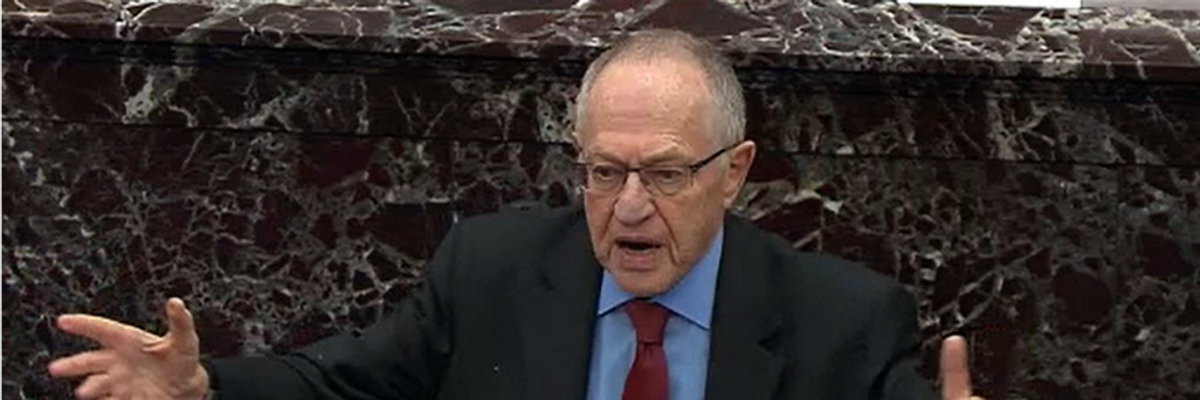While it may be too late to debunk Alan Dershowitz's "mixed-motives" theory of impeachment for the purposes of Trump's impeachment trial, it is still important to debunk it before the election in November. Otherwise, Trump and the Republicans will successfully use this desperate bullshit over the next nine months to rationalize their refusal to call witnesses.
Dershowitz's principal goal last week was to give Republican senators all the cover they need to deny witnesses in Trump's impeachment trial. His central thesis in support of this goal was that even if the House Managers conclusively proved their factual case against Trump - that is, even if they conclusively proved that Trump did indeed withhold military aid in exchange for election assistance from Ukrainian President Zelensky - this "proposal" (threat or offer) was not impeachable because Trump had the constitutional power to issue it.
If this was indeed Dershowitz's argument, then all of his pontificating about motives was unnecessary. He could simply have stated that even if the House Managers proved not only the quid pro quo but also that Trump's motive for the quid pro quo was fully corrupt, he still was exercising his constitutional powers and therefore cannot be impeached.
Apparently, however, Dershowitz did not feel comfortable leaving things there - most likely because it is not at all clear that Trump has either (a) the constitutional power to withhold congressionally authorized assistance to another country or (b) the constitutional power to threaten to withhold congressionally authorized assistance from another country unless and until the president of that other country did him (Trump) a personal favor. So Dershowitz hedged his bets by arguing that even if Trump abused his office by threatening Pres. Zelensky, this abuse of office still did not amount to an impeachable act.
But Dershowitz's reasoning for this conclusion is unclear. The best I can make out: Even if Trump abused his office with a corrupt motive, his abuse of office is not impeachable as long as he may also have had a legitimate motive - that is, a motive to benefit the public.
As many others have indicated, the main problem with this theory: it proves far too much. It proves that a president can never commit impeachable conduct. All a president would ever have to do to defend himself or herself is manufacture a legitimate motive. And if Dershowitz is right that "[e]very public official ... believes that his election is in the public interest," then - by definition - any president's misconduct in furtherance of re-election is at least partly in the public interest and is therefore unimpeachable. This is absurd.
Just imagine a defendant arguing that he is not guilty of robbing a bank because one of his motives was to give some of the stolen money to charity. Even if he could prove that he had this motive at the time of the crime, the jury would, and should, not care. For the purposes of assessing guilt, all that matters is the intent to commit the crime, not the motive(s) behind the intent. The same goes for "high crimes and misdemeanors."
Of course, motives can be mitigating factors. For example, the defendant who robs a bank to pay for his medical expenses is likely to receive a lesser sentence than a defendant who robs a bank to pay for a wealthier lifestyle. But, despite his underastandable motive, the needy defendant (as opposed to the greedy defendant) still intentionally stole and is therefore still guilty of robbery.
Dershowitz's fallacious reasoning here reminds me of the infamous "torture memo" written by Deputy Assistant Attorney General John Yoo on August 1, 2002. In this memo, Yoo tried to establish that certain harsh methods of interrogation did not necessarily constitute torture. Yoo's argument was that pain or suffering is not severe enough to satisfy the federal anti-torture statute, 18 U.S.C. SS 2340, unless it indicates "death, organ failure, or the permanent impairment of a significant body function in the absence of immediate medical treatment." By raising the bar so high for torture, Yoo thereby created ample legal space for "enhanced interrogation techniques" such as waterboarding. Yoo's argument, however, was entirely specious because his definition of "severe pain" came not from the criminal code but from a completely different context, the Medicare statute.
Dershowitz's argument is specious for the same reason. Mixed motives is an issue only in employment law. Section 2002e-2(m) of the Civil Rights Act of 1991 states that an "unlawful employment practice is established when the complaining party demonstrates that race, color, religion, sex, or national origin was a motivating factor ... even though other factors also motivated the practice." Suppose, for example, that an employer, Ted, terminates an employee, Susan, for both "shabby work product" and "failing to worship our Lord and Savior Jesus Christ." Even though the former motive is legitimate, the latter motive is not. Ted would therefore be liable in damages to Susan.
Dershowitz, then, committed two sins. First, he unjustifiably appropriated a standard from employment law and applied it to a wholly different area of law, impeachment. Second, he incorrectly applied the theory. Once again, Dershowitz maintained that the mere presence of a legitimate motive offsets the corrupt motive and thereby excuses or justifies the otherwise impeachable act. But the Civil Rights Act of 1991 says the very opposite: the mere presence of a corrupt motive renders the misconduct unlawful.
Dershowitz's mixed-motives theory has no merit whatsoever. Even if Trump had the public interest in mind when he extorted Ukrainian President Zelensky, he should still be convicted of this "high crime" and removed. No matter how much Dershowitz explains and obfuscates, a legitimate motive simply cannot magically immunize unconstitutional conduct against impeachment.
